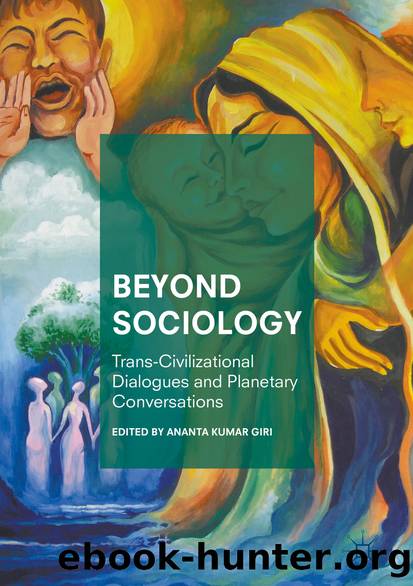Beyond Sociology by Ananta Kumar Giri

Author:Ananta Kumar Giri
Language: eng
Format: epub
Publisher: Springer Singapore, Singapore
By Way of Conclusion: From Practical Discourse to Practical Spirituality
Habermas does not “tie the criterion of rationality to the idea of self-constituting subject of history, he locates it in the basic context of action, in talk between subjects” (Wagner and Zipprian 1989: 103). This is the problem with the Habermasian approach to rationality and morality. The key question is whether we can have such a view of rationality or what he calls communicative rationality and realize the ends that he sets for himself; adequate motivational development of actors for them to be able to act upon their moral realization as critics and transformers. Can his procedure of rational argumentation actualize his worthy expectation that participants in discourse ethics realize that one who recognizes the interests of others “does not really sacrifice himself, but becomes a larger self” (Habermas 1987a: 94)? Realizing these goals requires a wider view of rationality where it is part of the consciousness of actors—a consciousness which is simultaneously rational and supra-rational, rational and spiritual. Habermas (1979: 93) believes that at the highest stage of moral development internal nature is moved into a “utopian perspective.” At this stage, internal nature is not subject to the “demands of ego autonomy; rather through a dependent ego it obtains free access to interpretive possibilities” (ibid.). He also hopes that moral consciousness as a kind of critique would terminate in a “transformation of the affective-motivational basis” of actors (Habermas 1972a, b: 234). But my argument in this chapter has been that his rational approach is incapable of realizing these worthy ideals; it has to be supplemented by spiritual praxis.
Habermas speaks of practical discourse. Communicative interaction is the most important part of this practical discourse. This practical discourse can be part of a practical spirituality (Metz 1970; Vivekananda 1991). Practical spirituality, as Swami Vivekananda (1991: 354) argues,27 urges us to realize that “the highest idea of morality and unselfishness goes hand in hand with the highest idea of metaphysical conception.” This highest conception pertains to the realization that man himself is God: “You are that Impersonal Being: that God for whom you have been searching all over the time is yourself—yourself not in the personal sense but in the impersonal” (Vivekananda 1991: 332). The task of practical spirituality begins with this realization but does not end there: its objective is to transform the world. The same Swami Vivekananda thus challenges: “The watchword of all well-being of all moral good is not ‘I’ but ‘thou’. Who cares whether there is a heaven or a hell, who cares if there is an unchangeable or not? Here is the world and it is full of misery. Go out into it as Buddha did, and struggle to lessen it or die in the attempt” (Vivekananda 1991: 353). What practical spirituality stresses is that the knowledge that one is Divine, one is part of a Universal Being, facilitates this mode of relating oneself to the world. This knowledge is not, however, for the acquisition of power over the other; rather it is to worship her as God.
Download
This site does not store any files on its server. We only index and link to content provided by other sites. Please contact the content providers to delete copyright contents if any and email us, we'll remove relevant links or contents immediately.
Nudge - Improving Decisions about Health, Wealth, and Happiness by Thaler Sunstein(6633)
iGen by Jean M. Twenge(4702)
The Fire Next Time by James Baldwin(4343)
Adulting by Kelly Williams Brown(3671)
The Sports Rules Book by Human Kinetics(3588)
The Hacking of the American Mind by Robert H. Lustig(3580)
The Ethical Slut by Janet W. Hardy(3504)
Captivate by Vanessa Van Edwards(3298)
Mummy Knew by Lisa James(3168)
In a Sunburned Country by Bill Bryson(2948)
Ants Among Elephants by Sujatha Gidla(2925)
The Worm at the Core by Sheldon Solomon(2918)
Suicide: A Study in Sociology by Emile Durkheim(2610)
The Slow Fix: Solve Problems, Work Smarter, and Live Better In a World Addicted to Speed by Carl Honore(2574)
Humans of New York by Brandon Stanton(2379)
Handbook of Forensic Sociology and Psychology by Stephen J. Morewitz & Mark L. Goldstein(2377)
Blackwell Companion to Sociology, The by Judith R. Blau(2319)
The Happy Hooker by Xaviera Hollander(2274)
Outliers by Malcolm Gladwell(2257)
